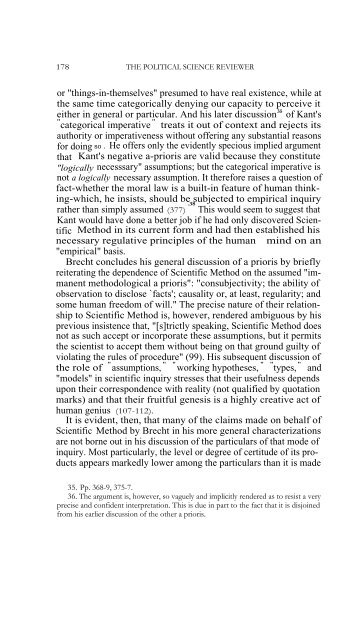ARNOLD BRECHT'S POLITICAL THEORY REVISITED Political ...
ARNOLD BRECHT'S POLITICAL THEORY REVISITED Political ...
ARNOLD BRECHT'S POLITICAL THEORY REVISITED Political ...
You also want an ePaper? Increase the reach of your titles
YUMPU automatically turns print PDFs into web optimized ePapers that Google loves.
178 THE <strong>POLITICAL</strong> SCIENCE REVIEWER<br />
or "things-in-themselves" presumed to have real existence, while at<br />
the same time categorically denying our capacity to perceive it<br />
either in general or particular. And his later discussion 35 of Kant's<br />
" categorical imperative " treats it out of context and rejects its<br />
authority or imperativeness without offering any substantial reasons<br />
for doing so . He offers only the evidently specious implied argument<br />
that Kant's negative a-prioris are valid because they constitute<br />
"logically necesssary" assumptions; but the categorical imperative is<br />
not a logically necessary assumption. It therefore raises a question of<br />
fact-whether the moral law is a built-in feature of human think-<br />
ing-which, he insists, should be subjected to empirical inquiry<br />
rather than simply assumed (377) .38<br />
This would seem to suggest that<br />
Kant would have done a better job if he had only discovered Scientific<br />
Method in its current form and had then established his<br />
necessary regulative principles of the human mind on an<br />
"empirical" basis.<br />
Brecht concludes his general discussion of a prioris by briefly<br />
reiterating the dependence of Scientific Method on the assumed "immanent<br />
methodological a prioris": "consubjectivity; the ability of<br />
observation to disclose `facts'; causality or, at least, regularity; and<br />
some human freedom of will." The precise nature of their relationship<br />
to Scientific Method is, however, rendered ambiguous by his<br />
previous insistence that, "[s]trictly speaking, Scientific Method does<br />
not as such accept or incorporate these assumptions, but it permits<br />
the scientist to accept them without being on that ground guilty of<br />
violating the rules of procedure" (99). His subsequent discussion of<br />
the role of " assumptions, " " working hypotheses, " " types, " and<br />
"models" in scientific inquiry stresses that their usefulness depends<br />
upon their correspondence with reality (not qualified by quotation<br />
marks) and that their fruitful genesis is a highly creative act of<br />
human genius (107-112).<br />
It is evident, then, that many of the claims made on behalf of<br />
Scientific Method by Brecht in his more general characterizations<br />
are not borne out in his discussion of the particulars of that mode of<br />
inquiry. Most particularly, the level or degree of certitude of its products<br />
appears markedly lower among the particulars than it is made<br />
35. Pp. 368-9, 375-7.<br />
36. The argument is, however, so vaguely and implicitly rendered as to resist a very<br />
precise and confident interpretation. This is due in part to the fact that it is disjoined<br />
from his earlier discussion of the other a prioris.
















